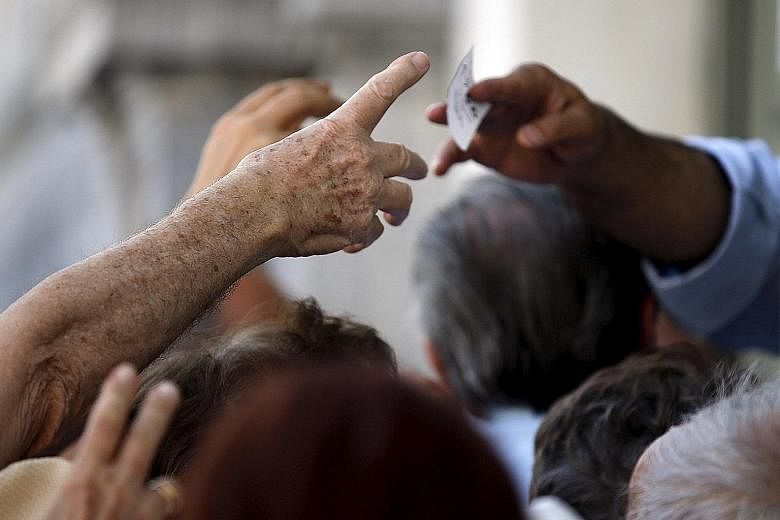ATHENS • Greece was hurtling yesterday towards a midnight deadline to submit new bailout plans to unlock billions of euros of fresh aid desperately needed to keep its struggling economy afloat and stop it crashing out of the euro.
Greek Prime Minister Alexis Tsipras vowed on Wednesday to present "credible" plans to seal more emergency loans from his exasperated European creditors ahead of a summit of all 28 EU leaders on the debt crisis on Sunday.
But amid the cacophony of voices predicting a possible exit of Greece from the currency, pressure was mounting on Greece's creditors to make the country's debt more sustainable, giving it a chance to rebound from a crisis that has slashed a quarter of its economy.
European Central Bank (ECB) president Mario Draghi, in a Corriere newspaper interview published yesterday, characterised the Greek situation as "really difficult".
The continent's most-indebted country has never been closer to leaving the currency after more than six European leaders made clear this is its last chance.
Failure to get a deal could result in the ECB cutting funds to Greek banks, forcing the country to issue IOUs or other forms of exchange to prevent an economic collapse.
"A few months ago, I wouldn't have believed that Greece would leave the euro area," ECB Governing Council member Ardo Hansson said in an interview in Estonian newspaper Postimees. "Now Greece's situation is much worse than it was even 10 days ago. The situation isn't hopeless but it is quickly and sharply deteriorating."
German Chancellor Angela Merkel, who as head of Europe's biggest economy carries the most sway, is doubtful Mr Tsipras will deliver a credible plan, and is willing to accept a Greek exit, according to two government officials familiar with her strategy.
Market reaction remained muted, with the benchmark Stoxx Europe 600 Index rising 1.8 per cent as of 1.30pm Brussels time and the euro sliding 0.2 per cent to US$1.106. However, while Greek bonds continued their decline, Portuguese and Italian bonds rose on optimism that Greece would be able to reach a deal, or that the ECB would act to protect other markets.
Pressure is also mounting on Dr Merkel and other European leaders to strike a deal. "Realistic proposal from Athens needs to be matched by realistic proposal from creditors on debt sustainability to create win-win situation," European Union president Donald Tusk said in a Twitter posting yesterday.
The ECB said on Wednesday it was leaving the level of aid to Greek banks unchanged. It will meet on Monday to consider its own next moves. Greece, meanwhile, extended its bank holiday and capital controls through Monday.
Sunday's gathering represents one of the biggest tests of a five-year effort to contain Greece's debts, which exceed 170 per cent of gross domestic product.
Even if there is a deal this Sunday, the country's exit from the currency bloc is more likely than not for the next two to three years, according to Citigroup Inc.
BLOOMBERG, REUTERS

